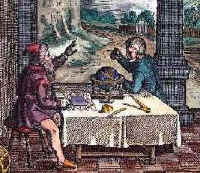|
|
After
the medieval boom of tales about the grail and about King Arthur, these
subjects vanished from common European literature. Only a couple of private
allusions are left to be found with e.g. Dante or J. W. v. Goethe, who seem to
have known something on the matter (cf. e.g. Goethe „Die Geheimnisse“ (The
Secrets)).
In
the last century, the existence of the fortress of the grail rsp. its
archetype were then re-discovered in the East by a spiritist medium
(Blavatsky). Mme Blavatsky, who herself was obviously not an Initiate, and
never had herself lived in Shambhalah, told us of spiritual super beings, whose
knowledge and power surpasses all common science by far, who live behind the
Himalayas and secretly guide the fate of this planet.
Mme
Blavatsky, who originally thought her story confirmed by a couple of occult
phenomena taking place in her surroundings, was later exposed of manipulation
(cf. records of the Society of
Psychical Research in London). Her pupils too went astray in many ways, and
again it became quiet around the grail and its knights.
Little
later, the idea of a sort of „grail-precinct“ got again popularized by
James Hiltons famous novel „The Lost Horizon“. Hilton describes
Shangri-La, an idyllic Tibetan convent, hidden behind snowy mountaintops,
where ageless people live a life dedicated to art, literature, music and
science.
Shangri-La
became a common term in English language standing for any kind of hidden
sanctuary or earthly paradise. Franklin D. Roosevelt named his rural domain
after Hiltons idyllic monastery. It was only after his death that the place
received its current name „Camp David“.
The
enormous effect of this novel, which can definitely be compared with the grail
myth in its time, gives again rise to the question: Had „The Lost Horizon“
only been a romantic figment of imagination, or does the novel have more
profound sources of which Hilton may not have been even aware?
Nowadays,
especially in Esoteric fields, the belief in wise and masterly beings living
in the Himalayas is, still or again, wide spread, although only few people
know what it is really all about.
|

|
